Casino Royale (2006, Dir. Martin Campbell):
M: While you were away, the world changed.
James Bond: Not for me.
– Die Another Day (2002)
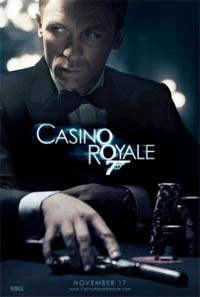 By some estimates, James Bond has been away for quite a while — but for how long? That depends on who, or what, you consider Bond to be. The James Bond featured in Ian Fleming’s trashy little classics has been MIA since the 60s; ditto for the cool-cat cinematic version immortalized by Sean Connery. As I wrote a while back, Bond has outgrown the specificity of his origins to become a Pop Culture Phenomenon, including all the self-reflexivity the term implies. Thus, like an aged elephant lumbering under its own weight, the Bond film series has grown more sluggish with each succeeding entry, all too mindful of formulae and audience expectations it is expected to fulfill. Less crowd-pleasing entertainment than Pavlovian circus, Die Another Day, the last entry in the Pierce Brosnan era, was a greatest hits compilation, chock-full of recycled gags and motifs, outlandish plot turns, and ill-advised nods to modern “filmmaking” — speed ramping in the edits, CGI stunts — that were hopelessly clunky, even as they tried to adhere to the style of today’s action film. And whither Bond? Overshadowed by the chaos around him, the ever-smooth, self-deprecating, lightweight Brosnan never had a chance. Of course, like many a Bond film, Die Another Day was also fun, in a faintly horrifying kind of way, and there lies the conundrum — is it possible that we, as an audience, have been conditioned to enjoy these juggernauts because of their inherent awfulness? Has Bond become less a character than a brand, an excuse to parade cringeworthy one-liners, females with suggestive names, and enemy plots to rule or destroy the world? Pavlovian, indeed.
By some estimates, James Bond has been away for quite a while — but for how long? That depends on who, or what, you consider Bond to be. The James Bond featured in Ian Fleming’s trashy little classics has been MIA since the 60s; ditto for the cool-cat cinematic version immortalized by Sean Connery. As I wrote a while back, Bond has outgrown the specificity of his origins to become a Pop Culture Phenomenon, including all the self-reflexivity the term implies. Thus, like an aged elephant lumbering under its own weight, the Bond film series has grown more sluggish with each succeeding entry, all too mindful of formulae and audience expectations it is expected to fulfill. Less crowd-pleasing entertainment than Pavlovian circus, Die Another Day, the last entry in the Pierce Brosnan era, was a greatest hits compilation, chock-full of recycled gags and motifs, outlandish plot turns, and ill-advised nods to modern “filmmaking” — speed ramping in the edits, CGI stunts — that were hopelessly clunky, even as they tried to adhere to the style of today’s action film. And whither Bond? Overshadowed by the chaos around him, the ever-smooth, self-deprecating, lightweight Brosnan never had a chance. Of course, like many a Bond film, Die Another Day was also fun, in a faintly horrifying kind of way, and there lies the conundrum — is it possible that we, as an audience, have been conditioned to enjoy these juggernauts because of their inherent awfulness? Has Bond become less a character than a brand, an excuse to parade cringeworthy one-liners, females with suggestive names, and enemy plots to rule or destroy the world? Pavlovian, indeed.
Financially speaking, Bond has never left — Die Another Day grossed close to half a billion dollars worldwide, enough dough to fund a few SPECTRE attempts to take over the planet. But as the quotation at the top of this essay cannily notes, we have entered a New World Order in the sober aftermath of 9-11. Heroes these days are tough, tormented, and literally tortured — not necessarily in that order. Kiefer Sutherland’s Jack Bauer from 24 and Matt Damon’s Jason Bourne from the Bourne movie franchise wouldn’t know how to order an aperitif if you gave them instructions, but they sure know how to break terrorist necks, and their ability to withstand pain puts them on par with Schwarzenegger’s Terminator. While 24 and Bourne dove straight into the damaged psyches of their protagonists, Die Another Day went the other way; all the accoutrements and epicurean mayhem of a standard Bond flick were in place, but Bond himself was a black hole, sucking everything into a great sound and fury that signified nothing. The very superficialities that made him attractive in the first place — the opulent tastes, the male model looks, quips and raised eyebrows taking the place of character — were reducing him to caricature.
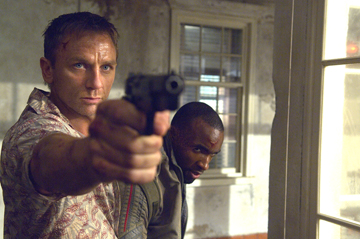 So the producers gambled, and came up with Daniel Craig as the new 007, prompting a firestorm of Internet criticism. Blond Bond, Short Bond, Brutish Bond, Ugly Bond — take your pick. But ironically enough, all the hand-wringing over Craig’s ascension to the throne points up the underlying strategy behind Casino Royale: use an actor who doesn’t fit anyone’s conception of the role to jump-start the series by restarting it, with the focus squarely on the character of Bond himself. Based on the first Ian Fleming novel (the first Bond film in quite a while to use a substantial portion of the book), Casino Royale is a sprawling, ungainly film — and it also happens to be the most purely entertaining Bond movie in a couple of decades.
So the producers gambled, and came up with Daniel Craig as the new 007, prompting a firestorm of Internet criticism. Blond Bond, Short Bond, Brutish Bond, Ugly Bond — take your pick. But ironically enough, all the hand-wringing over Craig’s ascension to the throne points up the underlying strategy behind Casino Royale: use an actor who doesn’t fit anyone’s conception of the role to jump-start the series by restarting it, with the focus squarely on the character of Bond himself. Based on the first Ian Fleming novel (the first Bond film in quite a while to use a substantial portion of the book), Casino Royale is a sprawling, ungainly film — and it also happens to be the most purely entertaining Bond movie in a couple of decades.
The customary pre-credits sequence, unusually concise this time, treats us to sights that are as far from the previous 20 films as one can get. Moody black-and-white visuals herald a brawl in a men’s room(!), and an decidedly unglamorous death by drowning in the sink. We are flashing back to Bond’s first kill, one of two assassinations that will earn him double-o status. Juxtaposed against this slugging match is Bond’s second hit, a clean execution of a traitor within MI6 which is as cool and elegant as the first kill is messy. Within these five minutes, we are introduced to a James Bond who has an actual character arc — an assassin who has the brains and brawn to become the polished secret agent of yore, but who hasn’t quite mastered the polish yet (as he himself puts it sarcastically, “half monk, half hitman”). And it is in these five minutes that the genius of casting Daniel Craig becomes evident: we peer at his craggy features, and those unlikely blue eyes with their tiny irises, and catch flickers of arrogance, disgust, and remorse. This Bond isn’t unflappable, but it’s dawning on him that he wants to be, and the struggle is intriguing.
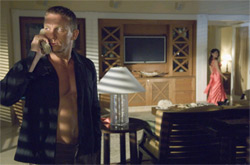 It seems only fair that after years of objectification in Bond films — the comely women, the shiny gadgets, the space-age lairs — we’ve finally gotten around to the objectification of Bond himself. The title sequence, usually the domain of “tastefully” nude girls, becomes a tribute to Bond as he is featured in silhouette, beating up would-be killers. Rather than a bikini-clad bimbo emerging from the sea, we get a shot of the impossibly buff Craig sauntering onto the beach dressed in tiny blue swim trunks. Speaking of buff, the film also takes care to incorporate the infamous torture from the novel, in which Bond is stripped and has his privates pummeled. On the other end of the spectrum, we also get a wry bit in which Craig dons the tuxedo for the first time and stares at himself in the mirror, almost incredulous at his transformation. It is as if the filmmakers are daring us to regard this man as an anthropologist would regard a skeleton, and reconsider him from the outside in. In keeping with this re-invention, our expectations are played with from the start. Many of the usual touches (Q and his wacky gadgets, Moneypenny, the juvenile quips, the flamboyant evildoers) have been jettisoned. The typical gunbarrel opening is repositioned to catch you unawares. At the outset, Bond is dressed down in civilian skivvies, and his ride isn’t an Aston Martin but a clunky Ford Mondeo (the venerable DB5 shows up soon enough). A dalliance with a villain’s mistress comes to a crashing halt before a single bedsheet is rumpled. “Vodka martini, shaken not stirred” is given a bracing twist.
It seems only fair that after years of objectification in Bond films — the comely women, the shiny gadgets, the space-age lairs — we’ve finally gotten around to the objectification of Bond himself. The title sequence, usually the domain of “tastefully” nude girls, becomes a tribute to Bond as he is featured in silhouette, beating up would-be killers. Rather than a bikini-clad bimbo emerging from the sea, we get a shot of the impossibly buff Craig sauntering onto the beach dressed in tiny blue swim trunks. Speaking of buff, the film also takes care to incorporate the infamous torture from the novel, in which Bond is stripped and has his privates pummeled. On the other end of the spectrum, we also get a wry bit in which Craig dons the tuxedo for the first time and stares at himself in the mirror, almost incredulous at his transformation. It is as if the filmmakers are daring us to regard this man as an anthropologist would regard a skeleton, and reconsider him from the outside in. In keeping with this re-invention, our expectations are played with from the start. Many of the usual touches (Q and his wacky gadgets, Moneypenny, the juvenile quips, the flamboyant evildoers) have been jettisoned. The typical gunbarrel opening is repositioned to catch you unawares. At the outset, Bond is dressed down in civilian skivvies, and his ride isn’t an Aston Martin but a clunky Ford Mondeo (the venerable DB5 shows up soon enough). A dalliance with a villain’s mistress comes to a crashing halt before a single bedsheet is rumpled. “Vodka martini, shaken not stirred” is given a bracing twist.
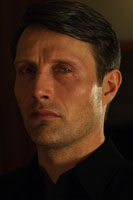 Fleming’s novel is a trim little tale in which Bond must bankrupt the odious Le Chiffre, high-ranking Russian agent, via a high-stakes game of baccarat. Along the way, all the trappings of the Bond milieu (specially prepared cocktails, dinner jackets, grotesque baddies, and pouty femme fatales) are seamlessly introduced, spiced with a dash of fatalism and a killer ending (“The bitch is dead”) that encapsulates the literary Bond’s detached yet easily bruised world view. Lacking the grandiose absurdity of Fleming’s later works (and most of the films), it’s a lean, mean novel, and the cinematic adaptation by Neal Purvis, Robert Wade, and the ubiquitous Paul Haggis holds true to the book’s intent for the most part. Le Chiffre (Mads Mikkelsen) is now a banker to fashionable terrorists everywhere, and his game of choice is poker — so far so topical, and just to remind audiences that this is a modern action film, the screenplay tacks on two lengthy action set pieces in Madagascar and Miami that pass the time before we get down and dirty at the titular casino. Although competently shot by Martin Campbell, and blessedly free from the CGI that plagued Die Another Day, these sequences feel a bit perfunctory, and render the film top-heavy. In keeping with Purvis and Wade’s previous scripts (The World Is Not Enough and Die Another Day), there’s plenty of double-crosses and murky character motivations that prompt some head-scratching down the stretch. The writers would do well to learn from Fleming and the classic Bond films in this regard — the audience’s dream of the Bondian life includes the idea that villains are easily identifiable, and missions and objectives razor-clear. In short, so blissfully not like real life.
Fleming’s novel is a trim little tale in which Bond must bankrupt the odious Le Chiffre, high-ranking Russian agent, via a high-stakes game of baccarat. Along the way, all the trappings of the Bond milieu (specially prepared cocktails, dinner jackets, grotesque baddies, and pouty femme fatales) are seamlessly introduced, spiced with a dash of fatalism and a killer ending (“The bitch is dead”) that encapsulates the literary Bond’s detached yet easily bruised world view. Lacking the grandiose absurdity of Fleming’s later works (and most of the films), it’s a lean, mean novel, and the cinematic adaptation by Neal Purvis, Robert Wade, and the ubiquitous Paul Haggis holds true to the book’s intent for the most part. Le Chiffre (Mads Mikkelsen) is now a banker to fashionable terrorists everywhere, and his game of choice is poker — so far so topical, and just to remind audiences that this is a modern action film, the screenplay tacks on two lengthy action set pieces in Madagascar and Miami that pass the time before we get down and dirty at the titular casino. Although competently shot by Martin Campbell, and blessedly free from the CGI that plagued Die Another Day, these sequences feel a bit perfunctory, and render the film top-heavy. In keeping with Purvis and Wade’s previous scripts (The World Is Not Enough and Die Another Day), there’s plenty of double-crosses and murky character motivations that prompt some head-scratching down the stretch. The writers would do well to learn from Fleming and the classic Bond films in this regard — the audience’s dream of the Bondian life includes the idea that villains are easily identifiable, and missions and objectives razor-clear. In short, so blissfully not like real life.
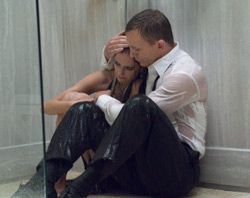 On the other hand, Casino Royale has a better sense of proportion than other recent Bonds — an understanding that a contremps at a card table, or the half-snarky, half-flirty exchanges between Bond and Vesper Lynd (Eva Green), the British Treasury agent assigned to keep tabs on the money Bond plays with, carry as much weight as the sight of a runaway truck crashing through a line of police cars. Above all, the film engrosses because of the three-dimensionality of Craig’s unruly 007. His Bond is a proto-Bond, all heedless ego and not as much discernment, still susceptible to impatience, pain, and doubt. His Bond understands why one should order Bollinger and Beluga caviar, but he’s also too busy tracking down terrorists to allow himself to savor them. It’s no accident that early in the film, he pursues his quarry by barreling straight through a wall, and that’s before he proceeds to shoot up an embassy and break into M’s home to access classified info (as M, Dame Judi Dench is as tart as ever, and this time she has good reason to be). The best Bonds (Sean Connery, Roger Moore) succeeded by playing their personas (charming sexist Connery, playboy aristocrat Moore) against the darker, more perverse tendencies of the character, and Craig carves out a niche by presenting himself as an Everyman Bond. He doesn’t breeze through his mission so much as bull through it, and yet he does it with an uncomplicated masculine ease that places the audience on his side.
On the other hand, Casino Royale has a better sense of proportion than other recent Bonds — an understanding that a contremps at a card table, or the half-snarky, half-flirty exchanges between Bond and Vesper Lynd (Eva Green), the British Treasury agent assigned to keep tabs on the money Bond plays with, carry as much weight as the sight of a runaway truck crashing through a line of police cars. Above all, the film engrosses because of the three-dimensionality of Craig’s unruly 007. His Bond is a proto-Bond, all heedless ego and not as much discernment, still susceptible to impatience, pain, and doubt. His Bond understands why one should order Bollinger and Beluga caviar, but he’s also too busy tracking down terrorists to allow himself to savor them. It’s no accident that early in the film, he pursues his quarry by barreling straight through a wall, and that’s before he proceeds to shoot up an embassy and break into M’s home to access classified info (as M, Dame Judi Dench is as tart as ever, and this time she has good reason to be). The best Bonds (Sean Connery, Roger Moore) succeeded by playing their personas (charming sexist Connery, playboy aristocrat Moore) against the darker, more perverse tendencies of the character, and Craig carves out a niche by presenting himself as an Everyman Bond. He doesn’t breeze through his mission so much as bull through it, and yet he does it with an uncomplicated masculine ease that places the audience on his side.
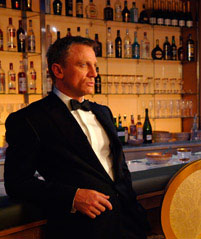 Fleming himself recognized that his character was all about duality — the certitude of Bond’s actions was forever at a remove from his self-doubts, and his prejudices against the fairer sex never prevented him from constantly placing his missions in jeopardy for their sake. The 007 of the books certainly knew how to cook gourmet eggs and charm the panties off countless women, but he never could completely escape the melancholy of being a “man who was a silhouette.” Craig is the first film Bond who has been given the opportunity to mine these depths, especially during the film’s lengthy coda, in which he succumbs to the charms of the inscrutable Vesper, only to run headlong into betrayal. All of this leads to an indelible conclusion in which Bond essentially renounces his humanity and becomes the familiar hero we’ve been awaiting all along.
Fleming himself recognized that his character was all about duality — the certitude of Bond’s actions was forever at a remove from his self-doubts, and his prejudices against the fairer sex never prevented him from constantly placing his missions in jeopardy for their sake. The 007 of the books certainly knew how to cook gourmet eggs and charm the panties off countless women, but he never could completely escape the melancholy of being a “man who was a silhouette.” Craig is the first film Bond who has been given the opportunity to mine these depths, especially during the film’s lengthy coda, in which he succumbs to the charms of the inscrutable Vesper, only to run headlong into betrayal. All of this leads to an indelible conclusion in which Bond essentially renounces his humanity and becomes the familiar hero we’ve been awaiting all along.
 Of course, this is still Bond, and these more somber strains are mixed in with the usual mayhem, but it is to Campbell and the screenwriters’ credit that for the first time in a long time, most of the elements are in sync. While the film is the most down-to-earth and brutal since Licence to Kill, its humor sneaks up on you (much of the dialogue has an old-time Hollywood crackle to it, no doubt thanks to Haggis’s involvement), and when Bond duels Le Chiffre across the gaming tables the tone finds the right balance between old-world glamour and witty character interactions. Ah, the characters: Mikkelsen is a creepy delight as Le Chiffre, gifted with a bleeding eye (“A derangement of the tear duct,” he explains apologetically) and a death mask’s glare, even when he becomes sweaty and desperate, while Giancarlo Giannini is all swervy charm as Bond’s not-quite-trustworthy ally Mathis, and Jeffrey Wright contributes a wry cameo as Felix Leiter, the “brother from Langley.” However, it’s Bond’s star-crossed relationship with Vesper that persists in the memory. Teasing one moment, smoldering the next, and ultimately vulnerable, Green is impossible to nail down, and it’s this quality that bewitches Bond (and us). Their doomed love may be slightly short-changed compared to the rest of the hijinks, but like On Her Majesty’s Secret Service, the last Bond movie to really cut to the heart of the character, it allows us to gain a glimpse of the tenuous human within the legend…and then the door slams triumphantly shut as Craig says those famous words — “The name’s Bond, James Bond” — with an authoritative venom that proclaims that James Bond is indeed back.
Of course, this is still Bond, and these more somber strains are mixed in with the usual mayhem, but it is to Campbell and the screenwriters’ credit that for the first time in a long time, most of the elements are in sync. While the film is the most down-to-earth and brutal since Licence to Kill, its humor sneaks up on you (much of the dialogue has an old-time Hollywood crackle to it, no doubt thanks to Haggis’s involvement), and when Bond duels Le Chiffre across the gaming tables the tone finds the right balance between old-world glamour and witty character interactions. Ah, the characters: Mikkelsen is a creepy delight as Le Chiffre, gifted with a bleeding eye (“A derangement of the tear duct,” he explains apologetically) and a death mask’s glare, even when he becomes sweaty and desperate, while Giancarlo Giannini is all swervy charm as Bond’s not-quite-trustworthy ally Mathis, and Jeffrey Wright contributes a wry cameo as Felix Leiter, the “brother from Langley.” However, it’s Bond’s star-crossed relationship with Vesper that persists in the memory. Teasing one moment, smoldering the next, and ultimately vulnerable, Green is impossible to nail down, and it’s this quality that bewitches Bond (and us). Their doomed love may be slightly short-changed compared to the rest of the hijinks, but like On Her Majesty’s Secret Service, the last Bond movie to really cut to the heart of the character, it allows us to gain a glimpse of the tenuous human within the legend…and then the door slams triumphantly shut as Craig says those famous words — “The name’s Bond, James Bond” — with an authoritative venom that proclaims that James Bond is indeed back.



Comments
Jonathan David Jackson
A truly authoritative review of the new Bond movie and the whole damn franchise. I adore your film-writing. Please note that the link to my […] Read MoreA truly authoritative review of the new Bond movie and the whole damn franchise. I adore your film-writing. Please note that the link to my name is arguably R-rated and a very special peak at the weapon that Q could never have given James Bond/ Daniel Craig, unless Q was the spy's mother. Read Less